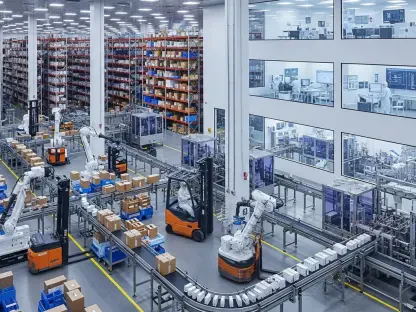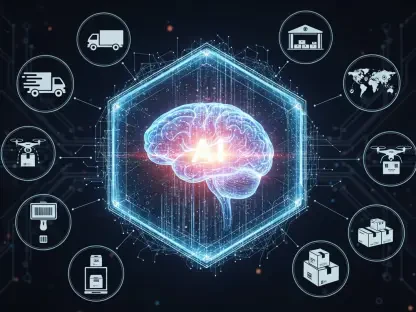What happens when frontline workers in retail, logistics, and healthcare are bogged down by slow, error-prone data processes while customer demands soar to unprecedented levels, creating a perfect storm of operational challenges? The answer lies in a groundbreaking tool that’s changing the game. Scandit SDK 8, a cutting-edge release in smart data capture, embeds artificial intelligence directly into everyday workflows, promising to turn chaos into precision. This isn’t just a tech upgrade—it’s a lifeline for industries grappling with efficiency challenges in high-stakes environments. Dive into how this innovation is reshaping the way businesses operate, one scan at a time.
Why Data Capture Evolution Matters Now
In today’s fast-paced operational landscape, the pressure on frontline teams to deliver flawless results with limited resources has never been higher. Manual data entry and outdated scanning methods often lead to costly mistakes, delayed processes, and frustrated employees. Scandit SDK 8 steps in as a pivotal solution, addressing these critical pain points with AI-driven technology that automates and streamlines tasks. Its significance lies in transforming inefficiencies into opportunities, ensuring that sectors like retail and air travel can keep pace with escalating demands.
The impact of such advancements cannot be overstated. Businesses lose millions annually due to errors in inventory management or slow check-in processes at airports. By integrating intelligent data capture, this tool offers a way to not only mitigate these losses but also enhance worker productivity and customer satisfaction. It’s a shift that’s essential for staying competitive in an era where every second counts.
The Rising Demand for Smarter Workflows
As industries evolve, the complexity of managing data in real-time has become a defining challenge. Frontline workers in warehouses or hospital settings often juggle multiple tasks under tight deadlines, where a single scanning error can ripple into significant setbacks. The need for a system that can adapt to these dynamic environments, reducing human error while speeding up processes, is no longer a luxury—it’s a necessity.
Scandit SDK 8 answers this call by leveraging augmented reality (AR) and AI to guide users through intricate workflows. For instance, in retail, it helps tackle stock discrepancies by prioritizing scans that align with profitability goals, while in logistics, it streamlines last-mile delivery with real-time visual cues. This targeted approach ensures that operations remain smooth even in the most cluttered or high-pressure scenarios.
Breakthrough Features Driving Unmatched Efficiency
Scandit SDK 8 redefines data capture with a suite of innovative features tailored to real-world challenges. Its AI-powered barcode scanning stands out by adapting to messy environments, filtering out unintended scans, and using text recognition as a fallback for damaged codes, cutting down errors dramatically. Meanwhile, MatrixScan Pick allows workers in warehouses to scan multiple items at once, with AR overlays confirming actions instantly—accelerating tasks by up to six times.
Another standout is Smart Label Capture, which extracts data from labels over ten times faster than manual methods, proving crucial for compliance tasks like checking expiration dates in retail. Additionally, features like Barcode Clustering speed up multi-barcode workflows by grouping related codes, while ID Bolt enhances travel document processing for airlines with customizable interfaces. A striking example comes from a luxury fashion retailer that saved over $1 million annually in labor costs by adopting these tools, showcasing the tangible impact of such advancements.
These features collectively mark a departure from traditional tools, focusing instead on predictive and adaptive intelligence. They don’t just capture data—they interpret context and guide decisions, ensuring that every scan contributes to broader operational goals. This level of precision is what sets the technology apart in crowded, competitive markets.
Voices from the Field on Contextual Intelligence
Industry experts and users alike are vocal about the transformative power of embedding intelligence into data capture. Christian Floerkemeier, CTO at Scandit, emphasizes the shift toward proactive solutions: “This technology understands user actions and anticipates needs, driving both efficiency and satisfaction.” His insight points to a fundamental change in how tools interact with workers, moving beyond mere functionality to actionable guidance.
Feedback from businesses paints a vivid picture of real-world benefits. Retail associates report less stress during inventory checks thanks to AR-guided scans, while logistics teams note faster last-mile deliveries with fewer errors. In healthcare, staff handling inventory management have seen reduced guesswork, leading to better patient outcomes. These testimonials highlight a clear trend: intelligent data capture isn’t just a technical upgrade—it’s a catalyst for happier, more effective teams.
Strategies to Maximize This Technology in Business
For organizations looking to harness the potential of Scandit SDK 8, the first step is pinpointing operational bottlenecks where manual processes create delays or errors. Areas like stock replenishment in retail or passenger check-in at airports are prime candidates for automation. Integrating this tool allows for AI-driven scanning to minimize mistakes and AR overlays to provide real-time worker guidance, addressing inefficiencies head-on.
Training teams to utilize specific features is equally critical. Focus on tools like MatrixScan Pick for environments requiring multi-item scanning or Smart Label Capture for rapid data extraction during compliance checks. Measure success through clear metrics such as reduced task completion times or lower error rates. Customization also plays a key role—tailoring interfaces like ID Bolt to reflect brand identity in customer-facing operations can enhance both functionality and user experience.
Beyond implementation, continuous evaluation ensures long-term value. Regularly assess how the technology adapts to evolving needs, adjusting workflows to leverage new capabilities as they emerge. This strategic approach transforms data capture from a routine task into a competitive edge, positioning businesses to thrive in demanding markets.
Reflecting on a Game-Changing Innovation
Looking back, Scandit SDK 8 proved to be a pivotal force in redefining how industries tackled data capture challenges. Its blend of AI and AR had reshaped workflows, turning error-prone manual tasks into seamless, automated processes. From retail floors to airport counters, the technology had delivered measurable gains in speed, accuracy, and cost savings.
As businesses moved forward, the focus shifted to scaling these solutions across broader operations. Exploring integrations with emerging technologies and adapting to unique industry needs became the next frontier. The journey of smart data capture continued to evolve, promising even greater efficiencies for those ready to embrace the next wave of innovation.









